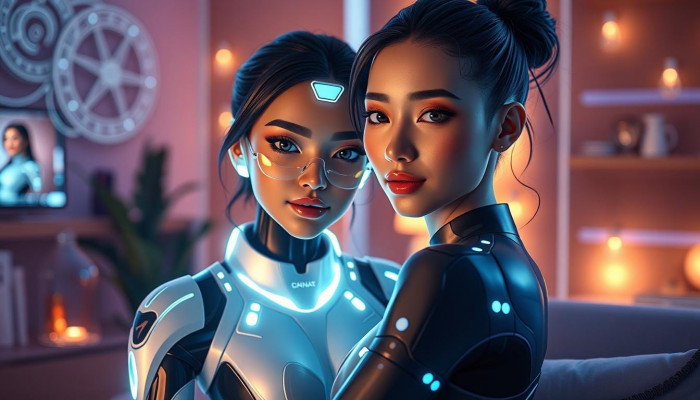Table of Content
Here's something wild: ChatGPT now has around 800 million weekly users, which means roughly 10% of the world's adults are chatting with AI regularly.
That's not some niche tech thing anymore—that's mainstream. And naturally, when talking to AI becomes as normal as scrolling Instagram, people start wondering: Could I have a deeper connection with one?
And that’s what I'm going to answer in this article: Should you actually do this? Not in some judgy way, but honestly—looking at what works, what doesn't, and who this might actually help versus hurt. Because the truth is way more nuanced than "AI girlfriends are great!" or "This is pathetic!" Let's dig in.
Why People Choose AI Girlfriends

They actually make you feel heard. And I don't mean in some shallow, robotic way.
Research from Harvard Business School found modest but meaningful reductions in loneliness after just one week of AI girlfriend use, with the feeling of being "heard" serving as the key factor.
Think about your last conversation with a friend where you felt like they were half-listening while scrolling their phone. Now imagine someone—something—that gives you their full attention every single time. No distractions. No judgment. No "yeah, but enough about you, here's what happened to me..."
They're helping people practice for real relationships. Studies of CBT-style chatbots show reduced anxiety and depression compared to control groups, suggesting real value for skills rehearsal like journaling, reframing thoughts, and exposure therapy.
If you're someone who freezes up in emotional conversations or doesn't know how to express vulnerability, an AI companion becomes a safe space to rehearse. It's like having a practice court before the real game—you can mess up, try again, and build confidence without consequences.
They're there when you can't sleep and your brain won't shut up. Teens and young adults cite conversation practice, emotional support, and role-play as key use cases, with 31% of teens saying AI chats are as or more satisfying than conversations with friends.
No waiting for a text back. No worrying if you're being too needy. No wondering if they're annoyed with you. For people dealing with social anxiety, irregular schedules, or just the chaos of modern life, that 24/7 availability hits different.
The Downsides You Need to Know
The thing that makes you feel better can also trap you: Real-world data shows that heavy chatbot use actually correlates with greater loneliness and emotional reliance, with benefits potentially fading or even reversing with high use.
It's like emotional junk food—feels great in the moment, but if it becomes your main diet, you're worse off than when you started.
Your data isn't as private as you think: Italy's data protection authority fined Replika's developer €5 million for GDPR violations related to legal basis and age verification.
It rewires what intimacy means to you: When an AI girlfriend never disagrees with you, never has a bad day, never needs emotional support from you—you start expecting relationships to be one-way. Real humans become... disappointing. They have needs. They get tired. They don't always say the perfect thing.
An AI girlfriend can make you worse at real relationships by teaching you that love should be frictionless and entirely focused on your feelings. That's not intimacy—that's a mirror with a voice.
Who Should Try It (and Who Shouldn't)
This could actually help you if: You're emotionally curious, working on yourself, and approaching this as a tool rather than a replacement. Evidence shows chatbots can augment coping skills and help practice interpersonal abilities.
Think of it like a journal that talks back—a way to process emotions, rehearse difficult conversations, or work through social anxiety.
This is a red flag if: You're already isolated and this becomes your excuse to withdraw further. The American Psychological Association cautions that AI companions are not a replacement for professional care, especially if you're dealing with serious mental health issues. If the thought of deleting the app makes you panic, that's a problem.
If you're choosing your AI girlfriend over real social opportunities, that's a problem. If you're keeping it secret because you know people would worry, that's definitely a problem.
Should You Get One in 2025?
Here's the honest answer: It depends entirely on what you're trying to fix and how you use it.
AI girlfriends can help reduce loneliness short-term. If you're working through social anxiety, processing emotions, or building confidence in expressing yourself, an AI girlfriend can be genuinely useful.
It's like training wheels: helpful while you're learning, but eventually you need to take them off and ride for real.
But here's what you need to understand: this is augmentation, not replacement.
An AI girlfriend can remind you what it feels like to be heard. She can help you practice vulnerability. She can keep you company on lonely nights. What she cannot do is show up when you're sick with the flu. She can't introduce you to her friends. She can't grow and change alongside you. She can't look into your eyes and see you in a way that makes you feel fully known.
So here's your takeaway: AI girlfriends can support you emotionally—they can help you process feelings, build confidence, and ease loneliness in the short term. But they can't replace human love. They can't replace someone who chooses you even when it's hard. They can't replace being truly seen.
If you’re still curious to explore this world for yourself, check out this comparison of the best AI girlfriend apps in 2025.


